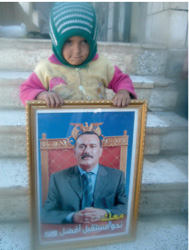
Taizi families are refugees in their own country [Archives:2008/1133/Last Page]
February 28 2008
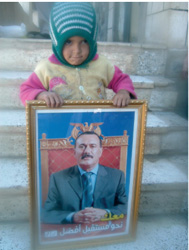 |
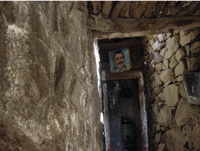 |
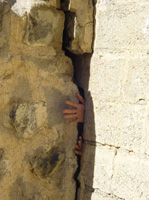 |
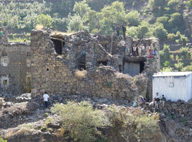 |
hamed_thabit@hotmail.com
Some 46 families who abandoned their homes in the wake of a destructive 2006 landslide in Taiz governorate continue to await the new homes the Yemeni government promised them while living in a nearby schoolhouse.
Constituting more than 250 people, the families are from Dhrae'm'a village in Al-Mowaset district in Izla'a Bani Hamad area.
The landslide, which occurred in October 2006, caused 21 houses to collapse. Villagers fled the wreckage of their former homes to take refuge in Al-Amal School next to their village. Although the Yemeni government promised to build them new homes, the families of Dhrae'm'a still are waiting a year and a half later.
Sixty-year-old Um Hani cooks at the school's makeshift campsite and tries to maintain some semblance of normalcy.
“Every day, officials tell us to wait and be patient and that very soon the government will build us new homes, but nothing seems to be happening. We're now like Palestinian refugees,” she observed, adding, “I don't want to feel like I'm a refugee in my own country.”
According to Al-Mowaset district manager Abdulmu'min Al-Qadasi, he and the area's local council referred the problem to Taiz governorate's Council of Ministers, which formed a committee to track the destruction and havoc caused by the landslide.
The committee, which included geologists, concluded that, following the landslide, villagers had to leave their homes immediately because they were in danger of collapsing at any moment and their lives were at risk. The local council and the district manager subsequently evacuated the inhabitants to a makeshift camp at Al-Amal School until the Yemeni government could build them new homes.
Some 21 families remain in the school, while 15 have gone to other nearby villages. A few the villagers were able to live with their relatives in other governorates and eight families returned to their homes in the destroyed village.
Feeling they had no other choice, those who returned to their homes don't care about the repercussions of doing so – including death.
The landslides destroyed Wahib Al-Haidari's three-story home, which took many years and cost YR 30 million to build, but due to the situation at the school, he and his family of 20 returned to their destroyed home.
When this landslide occurred in the village, several organizations and charities, such as the Charitable Society for Social Welfare, helped the families. The Red Crescent also provided foodstuffs and blankets to the families, but that was a year ago.
“We helped the locals with 210 blankets, 86 cubic meters of carpet in order to make the school rooms warm and clothing for the children,” said Abdulhalim Thabet, director of Al-Sowra charitable organization.
The situation at Al-Amal School is bad and the cold weather makes it even worse. Because three to four families share each classroom, none have any privacy. Additionally, the school has only three small bathrooms, which is another major problem.
“The government said it would build us new homes in a new location within a few months, but it's been a year and a half and nothing has been done,” complained 34-year-old Asim Al-Hamadi, who moved to the school with his family.
“Officials just keep talking and talking. We want real action and work,” says Ahmed Sa'eed, adding, “Are we Yemenis or not? Why are they treating us like this? Is it because we're poor families and not tribes?”
He points out that it's been six months since any officials visited the school campsite.
“Building new homes for all of the villagers will cost millions,” Al-Qadasi noted, “but our governorate doesn't have that much of money, which is why we handed over the responsibility to the Council of Ministers. However, up until now, nothing has been done.”
Al-Jumhuriah newspaper published a December 2006 story about President Ali Abdullah Saleh sanctioning new homes for the villagers, but still nothing has been done.
Bani Hassan's Sheikh Naji Yousef, who is responsible for villages in the area, has never helped them either, according to the villagers.
“I really wish officials would respect President Saleh's order, which was to take care of us and build us new homes as soon as possible,” Um Hani stated.
Al-Qadasi responded, “It's right that the president ordered to save these people and build them new houses, but it will take time. Until then, we're providing the villagers Al-Amal School.”
The situation for Al-Amal School students also is deteriorating. As of now, only six classrooms are used for teaching, while the other 12 are for the villagers.
According to teacher Sultan Mohammed Othman, many students have their lessons in outdoor camps, regardless of the weather, because the school now is being used for the displaced villagers.
According to Izzadeen Naji and Abdulraqib, who both teach at Al-Amal, conditions at the school are unacceptable. “Many students are absent because of the cold weather,” both teachers said.
In conclusion, as temporary school resident Al-Hamadi noted, “We're adults and we can handle what's happened to us, but I don't want my children to face this awful situation.”
——
[archive-e:1133-v:15-y:2008-d:2008-02-28-p:lastpage]


